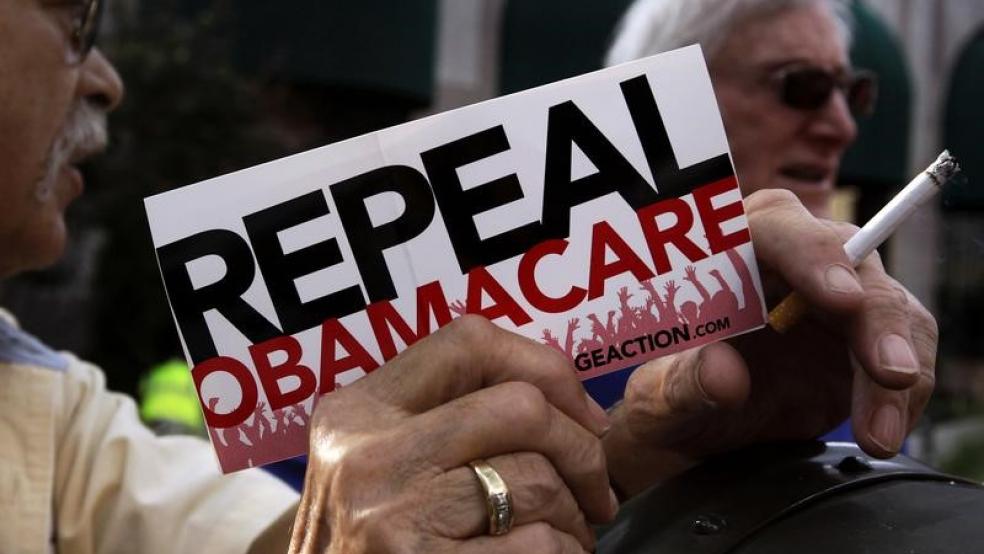During the election campaign in 2015 and 2016, Donald Trump repeatedly insisted that he didn’t want anything to do with entitlement reform. Even while promising to repeal Obamacare and Medicaid expansion, which was included in the Affordable Care Act, Trump promised not to touch Medicare or Social Security.
“I’m not going to cut Social Security like every other Republican, and I’m not going to cut Medicare or Medicaid,” Trump told David Brody in May 2015. Since then, he has remained steadfast on that promise, even as Republican leadership insists they can convince him to take on the challenge of entitlement reform during the next three years.
Related: How Health Care Is Crippling the Speaker of the House
After seeing the reaction from some Republicans to just a return of Medicaid to the status quo ante of 2009, Trump looks wise indeed to kick that can down the road. Rather than offer an honest assessment of the consequences of rolling back a costly and unsupportable mandate, everyone tried to promise nothing would change – and then got trapped by reality.
Before Monday’s score from the Congressional Budget Office, Republican leadership on both ends of Pennsylvania Avenue argued that the American Health Care Act (AHCA) would not leave any Americans in the lurch. In an op-ed for USA Today last week, Speaker Paul Ryan assured readers that they would have a stable transition.
“As we move from a Washington-driven system to a more vibrant market,” Ryan wrote, “we will make sure no one will have the rug pulled out from under them.” The day before the score came out, Health and Human Services Secretary Tom Price went even further. Price told NBC’s Chuck Todd on Meet the Press that “nobody will be worse off financially in the process that we’re going through.”
The next day, the CBO released its analysis of the AHCA, and it made clear that some Americans will face negative impacts from the AHCA. In the first year of Obamacare repeal, CBO estimates that there will be 14 million more uninsured than under the Affordable Care Act (ACA) – but those will result from the end of mandates that force people to buy insurance. By 2020, though, the Medicaid expansion in the ACA will end, and current and projected recipients on that safety-net program will comprise the bulk of the 24 million more Americans expected to be without insurance by 2026.
Related: Why the House GOP Health Care Replacement Plan Is Collapsing
The next day, Republicans tried pushing back on the CBO’s figures – but mainly avoided the Medicaid changes. Ryan told Fox News that he was “encouraged” by the CBO report, but that “they sort of overestimate the uninsured number.” Price said the administration’s analysts “disagree strenuously with the report that was put out.”
OMB director Mick Mulvaney stressed on MSNBC’s Morning Joe that the CBO missed widely on its estimates for enrollment in Obamacare, saying, “I don’t believe the facts are correct.” When Kasie Hunt challenged Mulvaney on the Medicaid rollback, he fell back on the private-market argument about those “who have coverage but don’t have care,” an argument that does not apply to Medicaid, as the rollback does nothing to improve access to those on the entitlement program.
All of this dances around a very clear reality: the Medicaid rollback will impact several million Americans who gained this benefit in the ACA. The impact of an Obamacare repeal on Medicaid should come as no surprise; indeed, Republicans have advocated repeal for the last seven years ever since Congress passed Obamacare, and that always included returning Medicaid to its 2009 parameters. Republicans set up a false expectation of zero impact, and now are blaming the CBO for reporting the obvious.
In fact, they are stepping on what should be an overall positive message. Despite gloom-and-doom predictions from Democrats, the CBO concluded that the AHCA will not destabilize insurer markets, and will eventually begin to bring premium prices back down as coverage alternatives and rational risk allocation return. It cuts $1.2 trillion in taxes while reducing deficit spending by $337 billion – a remarkable combination.
Related: Scrambling to Save Their Health Plan, Republicans Consider a Major Change
As Avik Roy points out at Forbes, the CBO’s analysis doesn’t even address “the macroeconomic effects that those tax cuts would have on economic growth, and thereby on greater tax revenues.” Nor does it address the potential for wage and employment growth with the elimination of employer mandates, employment caps on their enforcement, and full-time work requirements.
The flustered, unprepared, and arguably disingenuous response from Republicans this week does not bode well for future efforts on serious entitlement reform. The tens of trillions in unfunded mandates that will eventually bury the US economy and impose crippling debt do not result from offering too few benefits from these programs; those burdens result from too much expansion of entitlements, both in breadth and scope.
At some point, entitlement reform means restricting benefits, delaying eligibility, and increasing contributions in some combination. There are no end games to fiscal solvency for these programs that keep all their current promises and obligations. One way or another, bad news will be part of the effort, even while necessary to prevent much worse news.
Any serious effort will require brutal honesty, courageous leadership, and a shared sense of fiscal crisis between those who govern and are governed, but it starts with the latter being forthright with the former. This week hasn’t given much reason for confidence in the ability of reformers to deliver on any of those necessary qualities.






